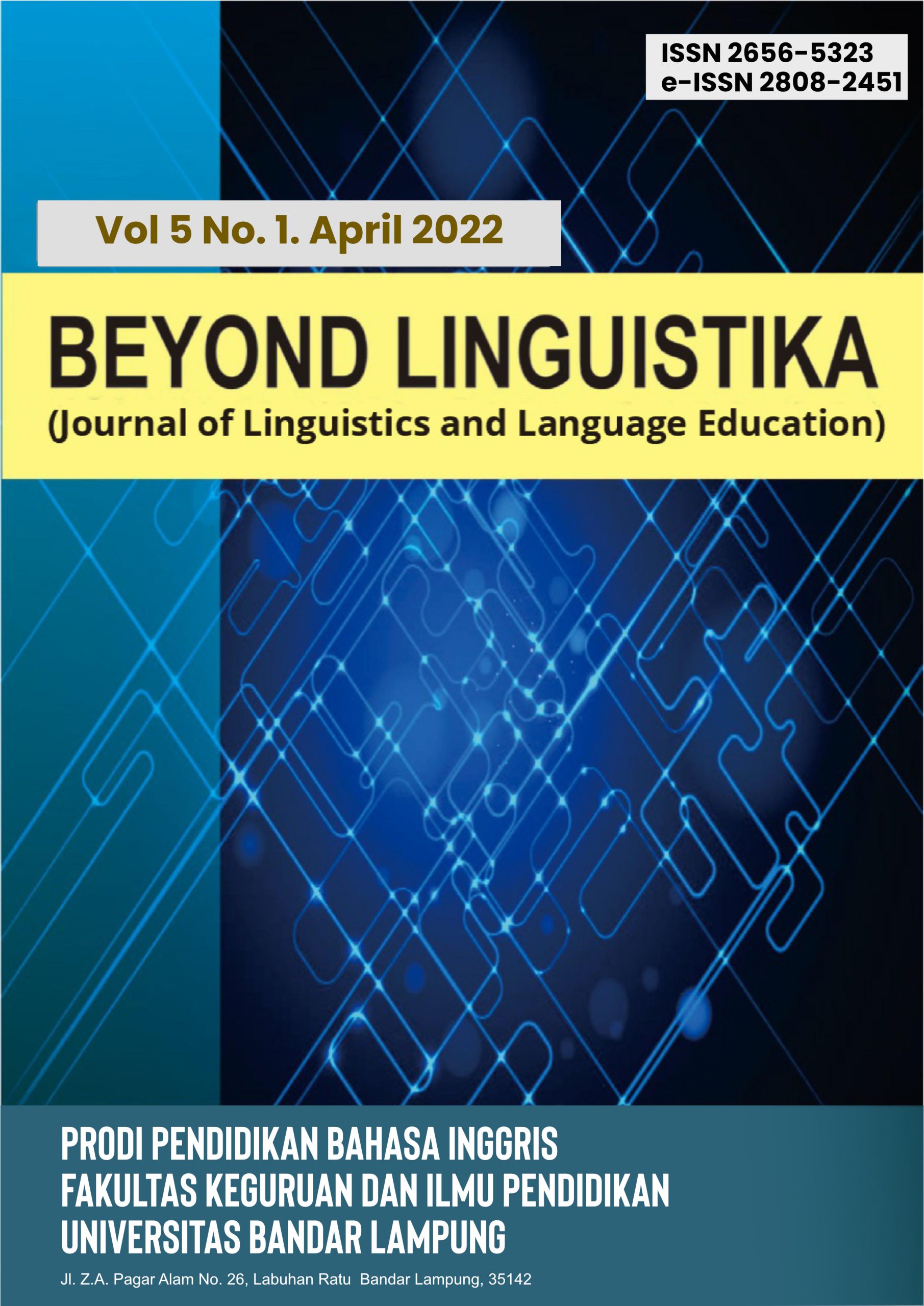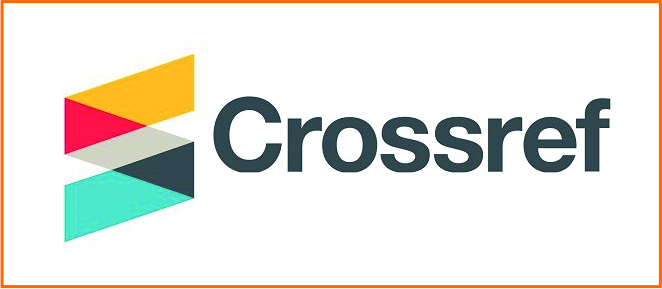Effective Pedagogical Approaches for Addressing Diverse Learning Styles in English Language Instruction at SMA Al Azhar 3 Bandar Lampung
Abstract
Keywords
Full Text:
PDFReferences
Alduais, A. M. S. (2018). Teaching and Learning Vocabulary: Insights from Learning Styles and Learning Theories. Journal of Child and Adolescent Behavior, 6(1), 1–4. https://doi.org/10.4172/2375-4494.1000370
Alfarhan, I. (2016). English as a Global Language and the Effects on Culture and Identity. American Research Journal of English and Literature (ARJEL), 2, 1–6. https://doi.org/10.21694/2378-9026.16010
Al-Khaza’leh, B., & Mohammed, I. A. (2020). Matching The Students’ Learning Preferences With Teacher’s Teaching Methods: The Case Of International EFL Students In Malaysia. Journal of Education in Black Sea Region, 5(2), 42–50. https://doi.org/10.31578/jebs.v5i2.198
Baker, W. (2009). The Cultures of English as a Lingua Franca. TESOL Quarterly, 43(4), 567–592. https://doi.org/https://doi.org/10.1002/j.1545-7249.2009.tb00187.x
Brutt-Griffler, J. (2017). English in the multilingual classroom: implications for research, policy and practice. PSU Research Review, 1(3), 216–228. https://doi.org/10.1108/PRR-10-2017-0042
Colorafi, K. J., & Evans, B. (2016). Qualitative Descriptive Methods in Health Science Research. HERD: Health Environments Research & Design Journal, 9(4), 16–25. https://doi.org/10.1177/1937586715614171
Cummins, J. (2014). Beyond language: Academic communication and student success. Linguistics and Education, 26, 145–154. https://doi.org/https://doi.org/10.1016/j.linged.2014.01.006
Daulay, R. F. (2023). Conducting English Teaching by Using Differentiation Instruction in 21st Century: A Student-Centered Approach. Journal JOEPALLT: Journal of English Pedagogy, Linguistics, Literature, and Teaching, 11(1). https://doi.org/https://doi.org/10.35194/jj.v11i1.3116
Dewey, M. (2007). English as a lingua franca and globalization: an interconnected perspective. International Journal of Applied Linguistics, 17(3), 332–354. https://doi.org/https://doi.org/10.1111/j.1473-4192.2007.00177.x
Dharmawan, Y. Y. (2023). Professional Identity of Faculty Members: A Case of Multilingual Context in the Periphery. In R. J. Dickey & H. K. Lee (Eds.), AsiaTEFL Proceedings 2023: Papers from the 21st AsiaTEFL Conference (pp. 1083–1096). AsiaTEFL.
El-Hmoudova, D. (2015). Assessment of Individual Learning Style Preferences with Respect to the Key Language Competences. Procedia - Social and Behavioral Sciences, 171, 40–48. https://doi.org/https://doi.org/10.1016/j.sbspro.2015.01.086
Evangelista, V. (2016). Teachers’ Strategies in Dealing with Students’ Various Learning Styles. https://api.semanticscholar.org/CorpusID:149359919
Fakhrunisa, F., & Herman, T. (2020). How should the teacher provide feedback and its follow-up in assessing mathematics learning? Journal of Physics: Conference Series, 1470(1), 12089. https://doi.org/10.1088/1742-6596/1470/1/012089
Felder, R. M., & Brent, R. (2005). Understanding Student Differences. Journal of Engineering Education, 94(1), 57–72. https://doi.org/https://doi.org/10.1002/j.2168-9830.2005.tb00829.x
Hattie, J. A. C., & Donoghue, G. M. (2016). Learning strategies: a synthesis and conceptual model. Npj Science of Learning, 1(1), 16013. https://doi.org/10.1038/npjscilearn.2016.13
Jang, B. G., Henretty, D., & Waymouth, H. (2018). A Pentagonal Pyramid Model for Differentiation in Literacy Instruction Across the Disciplines. Journal of Adolescent & Adult Literacy, 62(1), 45–53. https://doi.org/https://doi.org/10.1002/jaal.757
Jing, H. (2023). Global Englishes, Global Learning, and Teacher Cognition. In H. Jing (Ed.), Developing Global Awareness for Global Citizenship Education: English Language Teachers’ Beliefs and Practices in China (pp. 55–71). Springer Nature Singapore. https://doi.org/10.1007/978-981-99-4179-7_3
Joseph, V., & Khan, N. (2020). Digital Literacy Tools to Enhance English Reading and Writing Skills: A Detailed Literature Review. Global Language Review, 5(3), 21–33. https://doi.org/10.31703/glr.2020(V-III).03
Karimi, M. N., & Nazari, M. (2021). Growth in language teachers’ understanding of differentiated instruction: a sociocultural theory perspective. Journal of Education for Teaching, 47(3), 322–336. https://doi.org/10.1080/02607476.2021.1884973
Khan, M. O. (2020). Necessity of esp (English for specific purpose) courses for medical and science students at najran university, saudi arabia: An exploratory-cum-remedial study. Theory and Practice in Language Studies, 10(2), 208–217. https://doi.org/10.17507/tpls.1002.09
Kılıçoglu, A. (2018). Qualitative Research for Educational Science Researchers: A Review of An Introduction to Qualitative Research. In The Qualitative Report (Vol. 23, Issue 4, pp. 949–951). Nova Southeastern University. https://doi.org/10.46743/2160-3715/2018.3352
Liu, F., Hu, L., & Gan, J. (2013). A study on the learning style preferences with different academic backgrounds-taking Tujia EFL learners as examples. Theory and Practice in Language Studies, 3(1), 100–107. https://doi.org/10.4304/tpls.3.1.100-107
Lorenzo, A. R., & Lorenzo, B. U. (2013). Learning Styles of Teacher Education Students: Basis in Improving the Teaching - Learning Process. Procedia - Social and Behavioral Sciences, 103, 595–605. https://doi.org/https://doi.org/10.1016/j.sbspro.2013.10.377
Mazrui, A. A. (2008). The Power of Language and the Politics of Religion 1. The Round Table, 97(394), 79–97. https://doi.org/10.1080/00358530701844684
Naimie, Z., Siraj, S., Piaw, C. Y., Shagholi, R., & Abuzaid, R. A. (2010). Do you think your match is made in heaven? Teaching styles/learning styles match and mismatch revisited. Procedia - Social and Behavioral Sciences, 2(2), 349–353. https://doi.org/https://doi.org/10.1016/j.sbspro.2010.03.023
Ningrum, E. (2018). Strengthening Professional Competency on the Ability to Develop Learning Materials through Teacher Professional Education. IOP Conference Series: Earth and Environmental Science, 145(1), 12036. https://doi.org/10.1088/1755-1315/145/1/012036
Peranginangin, A., Sagala, A. Z., Lulbis, E. Y., & Pasaribu, A. E. A. (2020). EFL Learners Preference of Learning Style in ESP Class. Proceedings of the 5th Annual International Seminar on Transformative Education and Educational Leadership (AISTEEL 2020), 32–35. https://doi.org/10.2991/assehr.k.201124.008
Prachanant, N. (2012). Needs Analysis on English Language Use in Tourism Industry. Procedia - Social and Behavioral Sciences, 66, 117–125. https://doi.org/https://doi.org/10.1016/j.sbspro.2012.11.253
Pujiati, H., & Tamela, E. (2019). English Teaching and Learning Strategies on Genre Based Approach in Indonesian EFL Class : A Case Study. Proceedings of the Seventh International Conference on Languages and Arts (ICLA 2018), 397–403. https://doi.org/10.2991/icla-18.2019.66
Rahmiyanti, R., & Zaim, M. (2020). Students’ Perception on Teacher’s Teaching Strategy and Its Effect Toward Students’ Motivation in Learning English. Proceedings of the 7th International Conference on English Language and Teaching (ICOELT 2019), 41–44. https://doi.org/10.2991/assehr.k.200306.008
Ridwan, H., Sutresna, I., & Haryeti, P. (2019). Teaching styles of the teachers and learning styles of the students. Journal of Physics: Conference Series, 1318(1), 12028. https://doi.org/10.1088/1742-6596/1318/1/012028
Salam, U., Sukarti, & Arifin, Z. (2020). An Analysis of Learning Styles and Learning Strategies Used by a Successful Language Learner. JET (Journal of English Teaching), 6(2), 111–121. https://doi.org/https://doi.org/10.33541/jet.v6i2.1734
Sarwal, A. (2019). The Role of English as an Auxiliary International Language in a Globalized World. Journal of Globalization Studies, 11(2), 45–54. https://doi.org/https://doi.org/10.30884/jogs/2019.02.04
Setiawan, W., Iswoyo, & Pujiastuti. (2020). Perception of the Role of Social Media, Participation, and Behavior in Determining Political Options in the Indonesian Presidential Election in 2019. Proceedings of the 2nd International Conference on Education and Social Science Research (ICESRE 2019), 26–31. https://doi.org/10.2991/assehr.k.200318.005
Shakil, M. (2020). Factors Affecting Students’ Low Competence In Reading English at Primary Level in Pakistan. International Journal of Education (IJE), 8(3), 19–26. https://doi.org/10.5121/ije.2020.8303
Sholeh, M. B., Ahsin, N., Alany, Z., & Fatimah, F. (2022). The Integration of Religious Moderation Values in English Language Teaching in Madrasah. Proceedings of the International Conference on Madrasah Reform 2021 (ICMR 2021), 178–185. https://doi.org/10.2991/assehr.k.220104.027
Smokotin, V. M., Alekseyenko, A. S., & Petrova, G. I. (2014). The Phenomenon of Linguistic Globalization: English as the Global Lingua Franca (EGLF). Procedia - Social and Behavioral Sciences, 154, 509–513. https://doi.org/https://doi.org/10.1016/j.sbspro.2014.10.177
Stoynoff, S. (1993). Oxford’s Language learning strategies: What Every Teacher Should Know (Rebecca Oxford). Bilingual Research Journal, 17(1–2), 117–121. https://doi.org/10.1080/15235882.1993.10162651
Talukder, Md. M. R., Green, C., & Mamun-ur-Rashid, Md. (2021). Primary science teaching in Bangladesh: A critical analysis of the role of the DPEd program to improve the quality of learning in science teaching. Heliyon, 7(2), 1–12. https://doi.org/https://doi.org/10.1016/j.heliyon.2021.e06050
Vettorel, P. (2018). ELF and Communication Strategies: Are They Taken into Account in ELT Materials? RELC Journal, 49(1), 58–73. https://doi.org/10.1177/0033688217746204
Vita, G. De. (2001). Learning Styles, Culture and Inclusive Instruction in the Multicultural Classroom: A Business and Management Perspective. Innovations in Education and Teaching International, 38(2), 165–174. https://doi.org/10.1080/14703290110035437
Wekke, I. S., Yandra, A., & Hamuddin, B. (2017). Learning Strategy in Class Management: A Reflection from Manado Case. IOP Conference Series: Earth and Environmental Science, 97(1), 012053. https://doi.org/10.1088/1755-1315/97/1/012053
DOI: http://dx.doi.org/10.36448/bl.v6i2.3583
Refbacks
- There are currently no refbacks.















